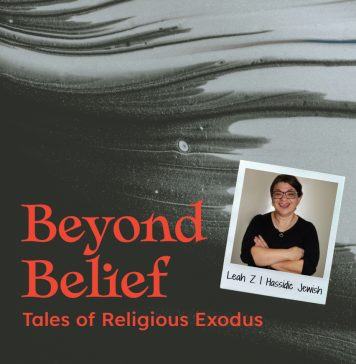He never learned much math.
Math was limited to two hours a week with a secular studies teacher who spent more time shouting at unruly classmates than teaching arithmetic.
It was a shame, because he would have been good at it.
He could have been an engineer, in an alternate universe. From the youngest age he’d loved construction. First playing with toy tools, then Knex and Lego, electric dinosaurs and space shuttles. After-school carpentry classes led to building his own loft bed. He could close the door to his room by pulling on a string.
Pull and push. It was basic physics.
He was the eldest of nine children. “But who’s counting?” his mother would laugh, apologizing to the shabbat guests who were incredulous at the site of a western woman subjecting herself to such numbers. “We have them one at a time,” she’d explain.
Nine cannot be divided evenly. When you do, you get a remainder. He learned this much later, once he’d left religion and started learning things.
He often felt like the remainder. So, apparently, did the rest of his siblings.
His room contained all the things that did not have a place. A fridge. Extra pots. A drum set. Him.
There wasn’t much need for math. Except for when calculating the sizes of the different ancient temples. They were measured in cubits. A cubit is six tfachim. A tefach is about the size of a grown man’s fist. It was all very scientific.
There wasn’t much need for math, but there were many things to count.
The seconds until next recess.
The minutes until school was over and he could go home.
How many times in a row Rabbi Shlomo Lipschitz could smack a child. He kept the tally in a little notebook. The record was 32.
How many times the class had read each chapter. The goal was 24.
He’d often lose count, even though he’d been appointed the coveted role of Repetition Counter. His mind would drift to better things.
Sunlight.
The geometric patterns in the white space between the letters.
How much dandruff he could accumulate in the cracks between the pages.
Counting the amount of times Rabbi Snertz adjusted his glasses in a single class (54). The traits with which one Acquired Torah (49, even though the Mishna said there were 48). The number of adult Jewish men over 20 when the Jews left Egypt (603,550) and the number after wandering the desert 40 years later (601,730), which was notable for both going down after two generations and for always conveniently ending in a multiple of 10.
Sometimes it got complicated. Counting the number of men in the room to make a minyan, while simultaneously making sure not to count people.
King David had counted his soldiers which caused God to start a plague that killed 70,000 people. To prevent another plague, you instead counted Kippas and Casios.
God, on the other hand, used math all the time. Every year, your good deeds and bad deeds were measured on a scale. If the good outweighed the bad, you’d earn yourself another year. If the bad outweighed the good, you’d be written in the book of death.
It’s not that God was vengeful, explained Rabbi Zeldman (He used to teach high school math, Rabbi Zeldman had, before moving on to teaching The Secrets of The Universe). These were the simple consequences of your own doing. A direct response to your own behaviors. Push and Pull. Basic physics.
This was why, in Elul, you needed to double down and load yourself up with good deeds. You didn’t have access to the tally.
Imagine you could check your spiritual bank account whenever you wanted. You’d find that your good deeds had been earning interest and you could afford to splurge on some sins. Or you’d find that your sins were hopelessly overdrawn and that there was no way you’d recoup before the year’s end. “Might as well go out with a bang,” you might say. And go bang a prostitute.
What I’m saying is: you not knowing math, is awfully convenient for God.
“Everything of importance requires precision,” he once heard Rebbetzin Heller say in a talk. He didn’t usually listen to women talk, because they were generally less wise. But Rebbetzin Heller was different. She was brilliant, his mother had informed him. She was a powerhouse.
Because precision is so important, we keep exactly 6 hours between milk and meat. Unless your tradition has it to only keep 3, or 1. Some people keep “into the 6th hour” which means 5 hours and one minute.
You usually only have to wait after eating meat. But if the milk was “strong”, like aged cheese, you had to wait after it too. How long was “aged”? 12 months.
Hell also lasted 12 months. Which, his rabbis pointed out, is still a very long time to be suffering in the most excruciating way possible.
He was encouraged to use his imagination.
Imagine yourself with a hot iron pressed to your face.
Imagine a catapult throwing you from one end of the world to the other.
Imagine eating burning coals.
Imagine boiling in a pot of your own spilled semen.
Imagine.
There were numbers everywhere.
The Six Constant Mitzvos, to be contemplated continuously.
6 million Jews killed in the holocaust.
21 killed and 76 wounded in the latest bus bombing.
Count the days until you die.
Imagine yourself with one foot in the grave.
That’s what Rabbi Nissim Karelitz used to do – he’d lie in a dug grave and contemplate his meager existence.
Every day was an opportunity, extolled Rabbi Noach Weinberg, pounding the podium and peering over the top of his glasses, smiling with benevolent fury.
Each Jewish soul saved.
Each righteous act tipping the scales.
Each word of Torah rebuilding another golden brick in the heavenly temple.













